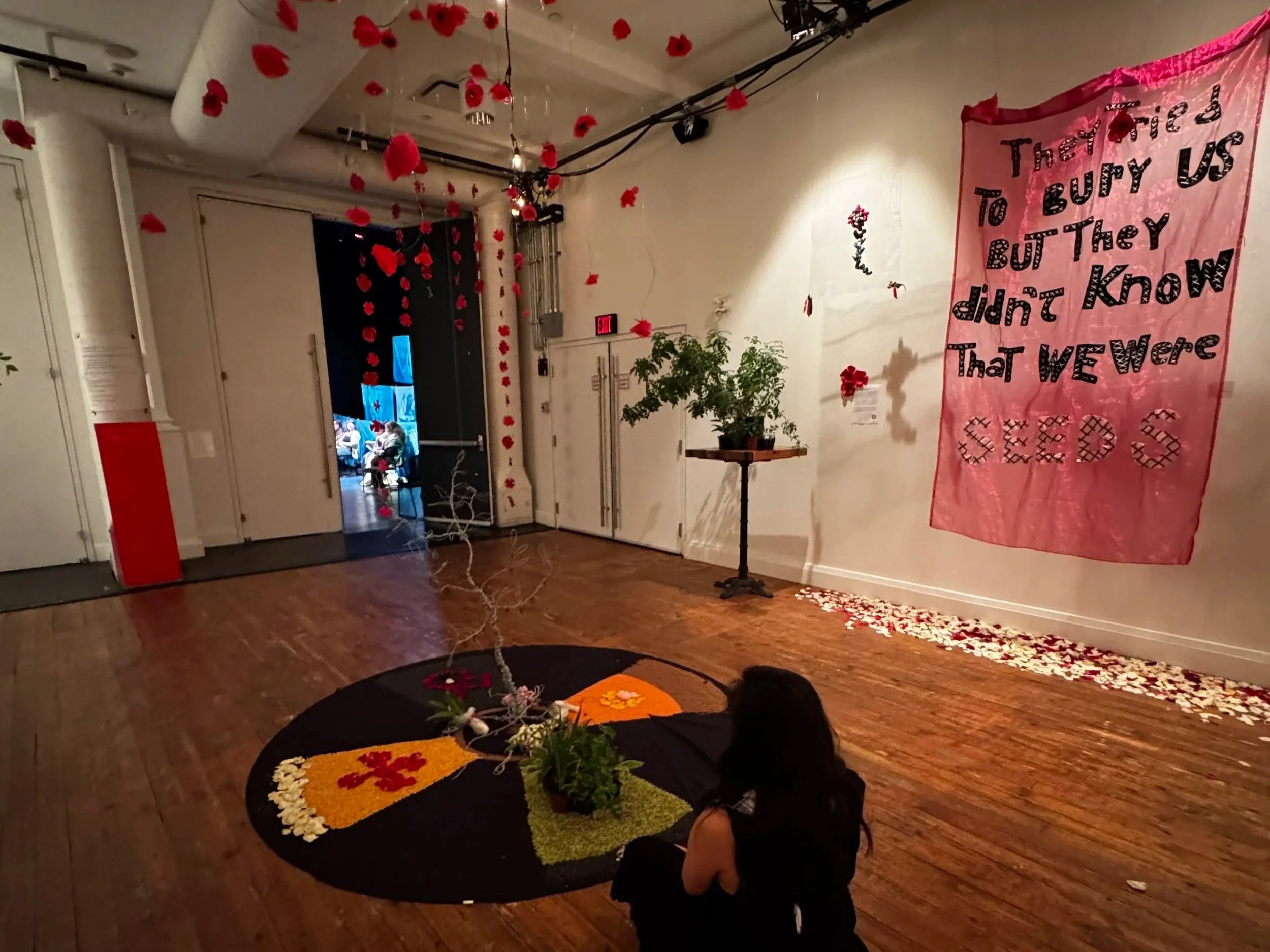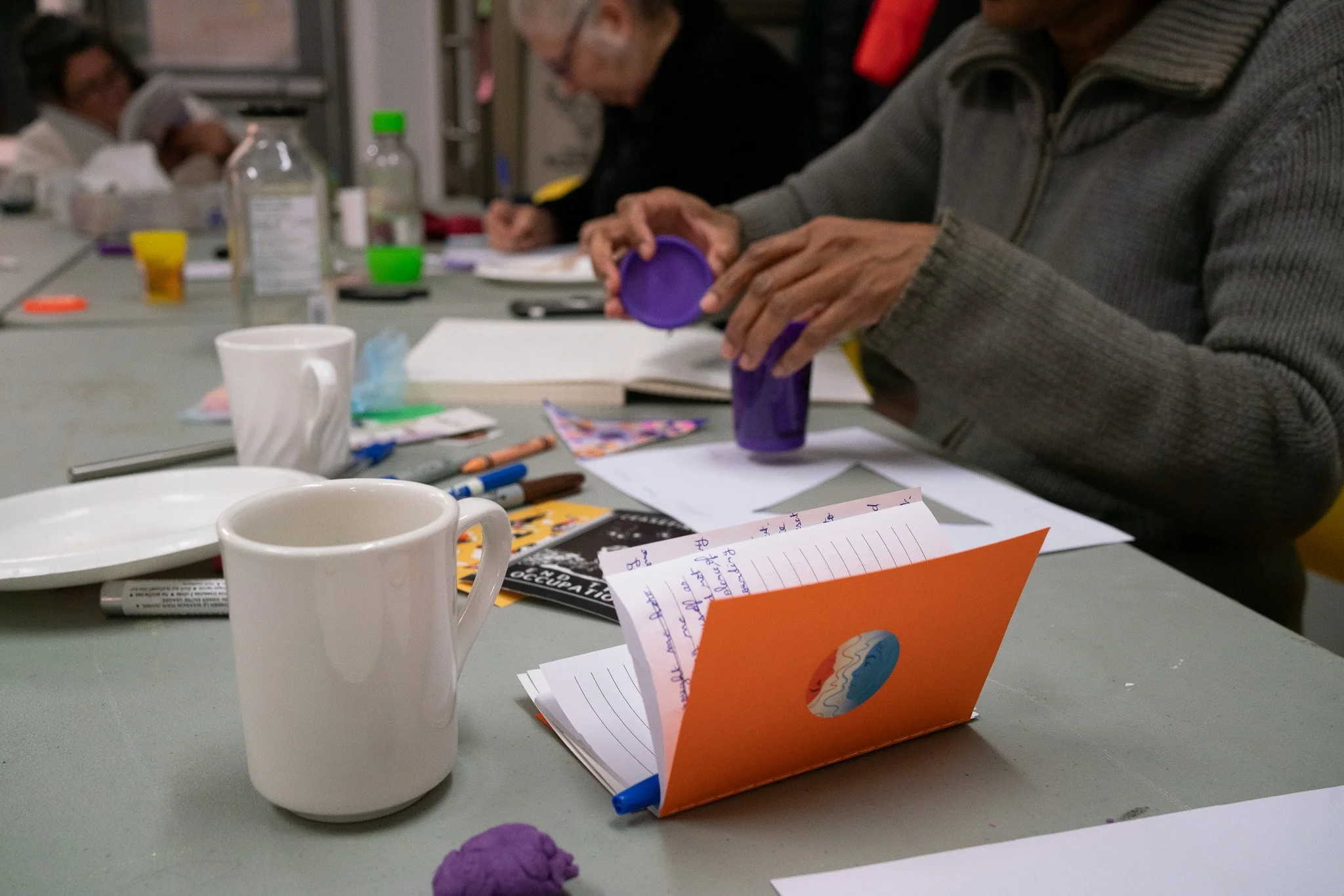Our world feels immeasurably heavy and surreal these days. Every day, I scroll through my social media feed to find images of people in Gaza being intentionally starved by a colonial and apartheid state, I watch videos of ICE brutally ripping people away from their families, and I read headlines of the state violently infringing on trans people’s rights to bodily autonomy and dignity. And that’s just a quick flick of the doomscroll.
I see and feel and experience the chaos in my everyday life too. I wake up to look out my window and find a haze of smoke covering the city skyline from wildfires burning across the country. I walk down the streets of Tkaronto and I see my unhoused neighbours struggling in the extreme heat and suffering from addiction with no sufficient resources or support. As I talk to friends and colleagues in arts and culture, as well as those doing important work in anti-racism and anti-oppression, we commiserate about the waning interest and monetary investment in our work following the cuts to diversity, equity, and inclusion initiatives. In my community organizing circles, we are witnessing an increase in surveillance and policing of our demands for justice. Just the other weekend, I watched as members of my community were arrested for peacefully protesting our government’s complicity in genocide.
It’s crazy making. And there are many days where I am left feeling depleted, untethered, and unmoored.
I am trying to hold space for myself to feel into these realities. I am trying to hold grace for the part of me that is burned out, discouraged, and weighed down by these massive systemic forces. I am trying to hold compassion and love (so much love!) for the part of me that is deeply, deeply devastated by all the destruction around us.
Yes, and…
Art installation at Marking the Nakba: 24-Hours of Palestinian Poetry by Rica Guidino, Paz Jurado, and the Watermelon Collective.
I know that despair is the point.
I know that the relentless destruction is meant to stun us into passivity. I know that the unabating chaos is meant to shock us into inaction.
And I know that we cannot let that happen.
I know – though I must remind myself over and over and over again – that the antidote to all this despair is action.
I know – though I must remind myself over and over and over again – that I must keep focused on what I am passionate about and what I can contribute in my sphere(s) of influence.
Our Work Is Revolutionary Work
In these times of fierce division and never-ending destruction, the work of building intentional spaces of care and belonging isn’t just important, it is vitally urgent. And I remind myself that the work that we do at Living Hyphen – of cultivating and fostering a culture of courageous and tender storytelling amongst racialized communities – is revolutionary work.
At Living Hyphen, we approach storytelling as a connection both to ourselves and to others. We approach storytelling as a pathway to healing. We approach storytelling as a key to unlocking just and equitable futures.
That’s why over the last few years, we have been partnering with school boards across Ontario, with settlement agencies across the country, and with cultural institutions across North America to train educators, settlement workers, and frontline staff to centre storytelling in their work in ways that are decolonial, intersectional, anti-oppressive, and most importantly, rooted in care.
We challenge the limited/limiting standards that have come to define success in our world. Standards that hold English as the marker of excellence. Standards that demand perfectionism over our individual and collective well-being. Standards that seek to control rather than to empower.
We have been collaborating with educators, settlement workers, arts and culture workers, and frontline staff to transcend these rigid constructs of our current systems and reimagine and build more dynamic, caring, and emergent spaces that better serve our communities. Spaces that encourage mess and complexity. Spaces that prioritize the nourishing and healing process of storytelling over its product. Spaces that practice embodiment, bringing together mind and body.
We are honoured to share our approach, our strategies, and our practices of play and experimentation with a growing number of partners across the country, who we hope will, in turn, live out these approaches in their work and with their respective communities.
An Ask & An Invitation
As I wade through these immeasurably heavy and surreal days, I write to you with an ask:
Will you share our work across your sphere(s) of influence and help us bring our approach to storytelling to your communities?
We need your help to continue building on and deepening this work across communities with new partners across the country. Who do you know within your networks that might be interested in our work? We’d love to connect with them and plant seeds of partnership and collaboration!
Photo by Gallery 101.
I also write to you with an invitation:
If you are an educator looking to engage your students in creative storytelling, please get in touch. If you are a community leader with a group interested in sharing their stories, please get in touch. If you are a settlement worker trying to connect with newcomers through stories, please get in touch. If you are a school board administrator seeking out interactive opportunities for your classrooms, please get in touch.
At Living Hyphen, we are committed to creating intentional spaces where hyphenated Canadians feel compelled and confident to share their nuanced and complex stories. And we know that our care-filled, decolonial, and intersectional approach to storytelling has the power to shift our internal narratives, bring our communities together, and ultimately transform our world.
As I move through the heaviness of these days, I remind myself of what Václav Havel once said:
“Hope is not the conviction that something will turn out well, but the certainty that something is worth doing no matter how it turns out.”
And what could be more worth doing than speaking our stories out loud in community with tenderness and courage?
In loving solidarity,
Justine



